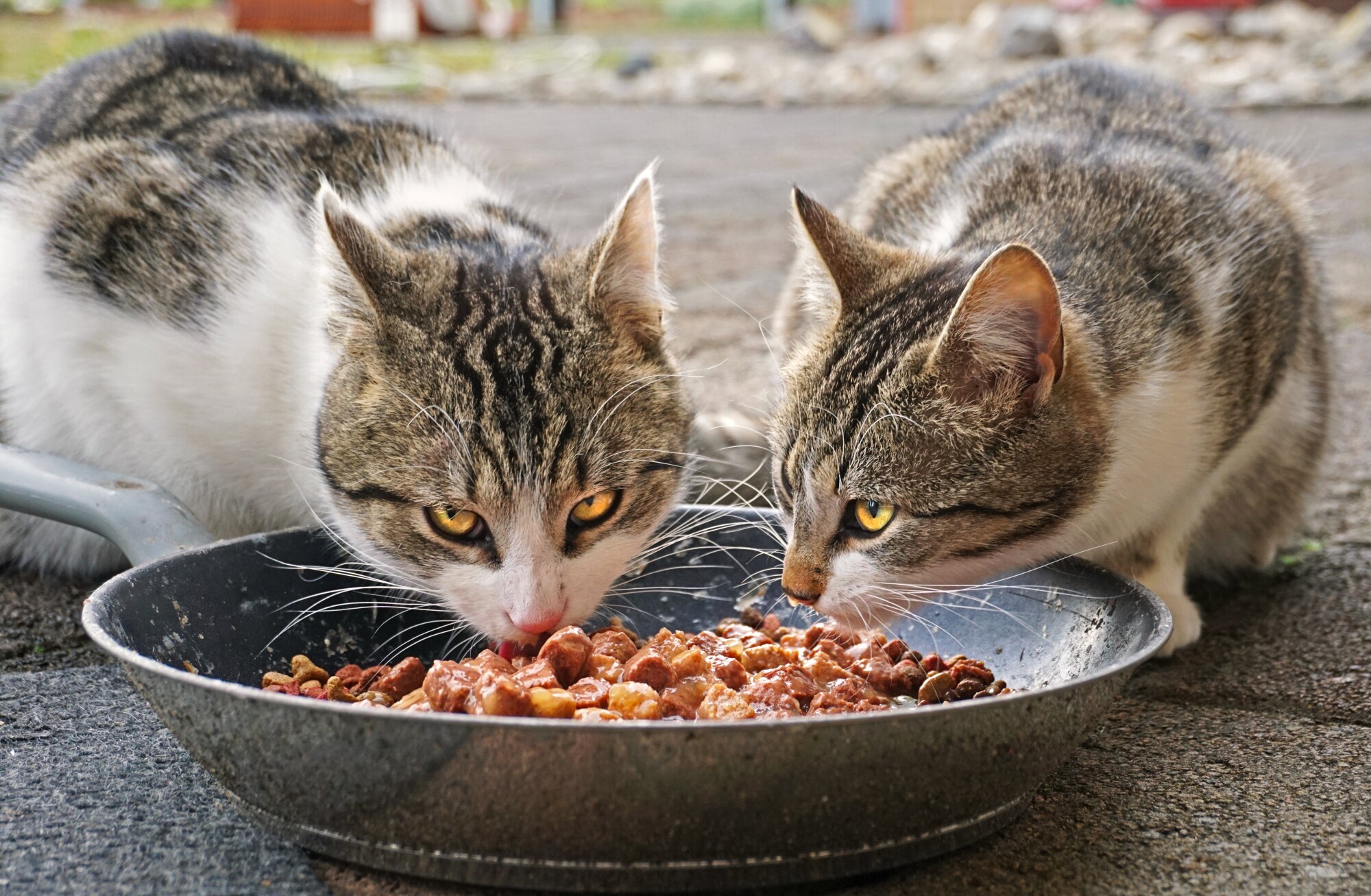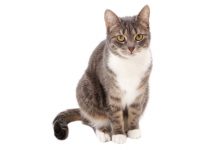Do you know One in four households in the USA has a cat?
These furry, four-legged friends have crept into our lives, hearts, and kitchen cupboards. As such, you have likely been woken by a hungry meow early in the morning, usually followed by a paw to the face if we don’t respond in time. Like us humans, cats get pretty hungry at the start of the day, and they like to begin their 18-hour schedule of napping in a sunbeam with a healthy Breakfast for Cats.
But what do cats like to eat for Breakfast? Can we feed them human food? Is Canned Cat food Safe? And do they really want to eat breakfast? Keep reading to find out the surprising number of foods you can add to cats’ diet to improve their nutrition.
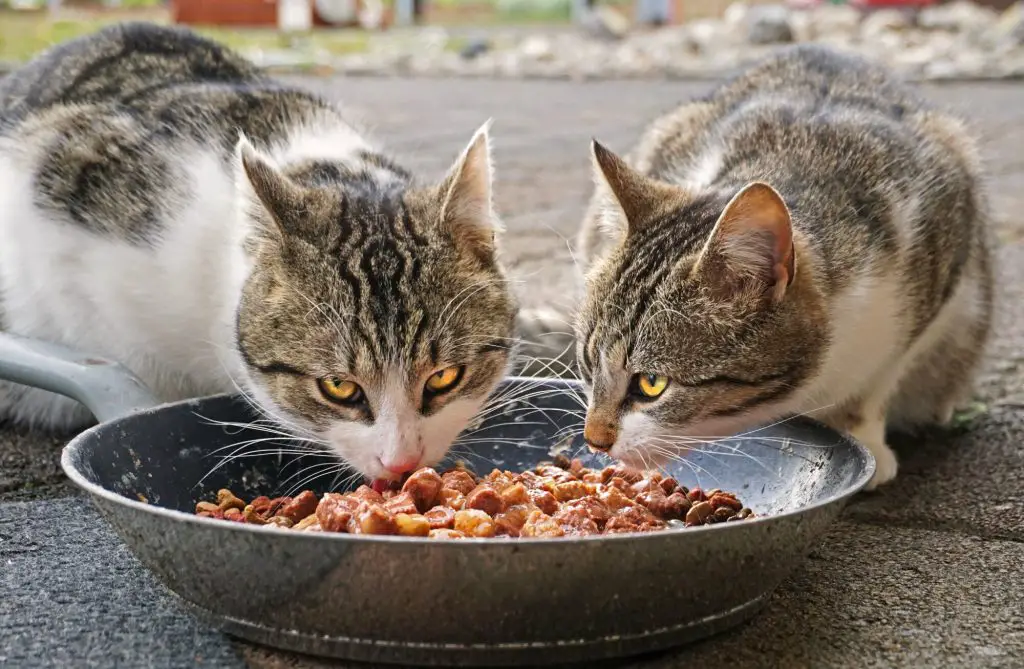
Contents
Cat Nutrition & Cat Breakfast
Cats eat small animals like mice, bats, and birds in the wild. A 10-pound cat requires around 200 calories a day to maintain a healthy weight. Most cats will only eat until they are sated and do not show the same level of food jealousy around other animals as their canine counterparts.
Cats are obligate carnivores. That means they have to eat meat to get their required daily nutrients. They get essential amino acids like taurine and arginine from their food and need them in their diet to stay healthy. They can, however, eat vegetables and even some fruits for extra nutrition, but they do not need to as they can get everything they need from meat sources.
It is possible to change up your cat’s nutrition to include different food sources, but you must make sure that they are also eating a meat source, or specialist cat food, to ensure they get the necessary proteins for survival.
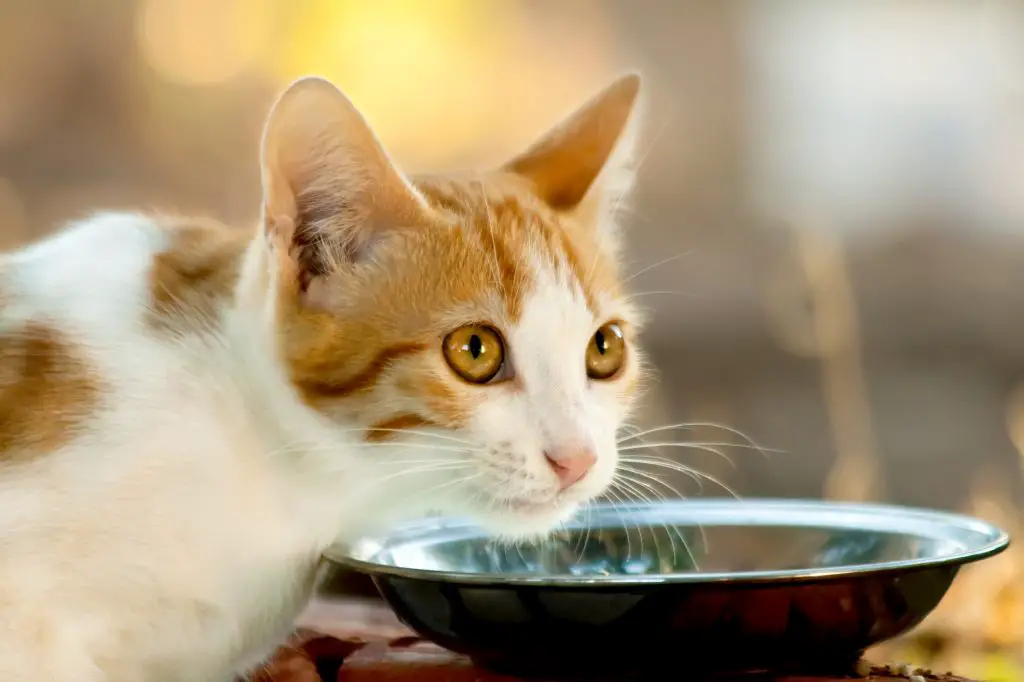
Foods Cats Like To Eat for Breakfast
There are lots of foods that you may find your feline friend likes to steal from your plate or kitchen. Most of them are safe but need to prepared properly first. So, if you want to liven up your kitty’s next breakfast, let’s look at some of the ‘human’ foods you can give them for a change of pace from the usual morning kibble.
Carrots
Carrots can be great for your cat’s eyes and coat as they are rich in beta carotene. You do need to make sure that you peel the carrot first, as the skin can be pretty tough for cats to chew. It is also best to cook the carrot to make it easier to swallow.
Cucumbers
While Instagram and TikTok would have you believe that cats are scared of cucumbers actually many love to eat them. In fact, there is a famous Finnish cat who can not get enough of them!
Cucumbers have lots of C and K vitamins as well as being chock full of water. They make an excellent snack for overweight kitties, and they are a good option for cats in summer when they may not be drinking enough water throughout the day. Again, it is best to peel and cut the cucumber into strips before feeding it to your cat.
Pumpkin
The flesh of a pumpkin is safe (and delicious) for a cat to eat as long as you remove the outer skin and seeds. It works best as a puree when mixed in with other cat foods. Pumpkins contain lots of roughage to help keep your cat’s digestion in good working order, and it may help with any constipation or issues with diarrhea.
Melons
Cats like to eat melons. It’s true. They love cantaloupes, watermelons, and honeydew, but they do need to watch their intake as melons can be too high in sugar for our feline friends.
You can feed a cat any of these types of melon but again, be sure that you remove any hard outer skin or seeds. Try feeding your cats with small bites at first. The high water content and wealth of vitamins like A, B, and C will be a beneficial addition to your cat’s diet.
Pineapple
Nutritionally pineapple is good for the immune and digestive systems. This is another fruit that you may find your cat likes to munch on and might make a sweet breakfast option. Once again, the sugar content in pineapples is very high, so you need to be aware of how much you are feeding them.
If you like feeding your cats breakfast by hand, then cut the pineapple into small chunks and make sure you remove all the hard outer skin and leave just the soft flesh.
Strawberries
A delicious breakfast for cats could include these tasty red berries. They are rich in vitamin C, potassium, and fiber, so they could benefit your kitty’s immune system. Make sure to remove any stalks, but the seeds will not be a problem for a cat to swallow.
Cranberries
As well as strawberries, you can also feed your kitty a few cranberries from time to time. They may prefer to bat it around the kitchen rather than eat it, but those that do will benefit from the magnesium and dietary fiber. However, do not feed them processed cranberry sauces, as these tend to be very high in sugar and will cause an upset stomach.
Fish Oil Supplements
Omega fish oils can do wonders for your cat’s glossy coat and help prevent them from developing dry skin patches in the colder months. You can buy supplements specifically designed for cats rather than those formulated for humans. You will find that these are better for them as they provide the right amount of nutrients for a cat-sized body.
Supplement your cat’s meals with fish oil for a few weeks, and you will start to see a noticeable difference in their skin and coat health.
Eggs
Cooked eggs are a fantastic source of protein for both you and your cats. In fact, eggs are already an ingredient in many of the higher-grade cat foods available in the stores. As well as protein, they provide a rich source of B vitamins.
You must make sure that you cook any eggs before feeding your cats. Uncooked eggs will carry the same risks for cats as they do for us and could be harboring bacteria like Salmonella. Raw egg whites can actually lead to a vitamin deficiency in cats as they will prevent them from being able to absorb essential vitamins.
Rice
You can feed your cat small amounts of rice, but you should not do it very often. The high levels of natural fiber can help with digestive issues, but cats’ stomachs may become sensitive to rice if eaten for an extended period. Cats are carnivores, after all, and do not mix well with cereals and grains in the long term.
As a one-off treat, rice is fine for a cat. Make sure it is well cooked before serving it, and keep the portions very small.
Meats
All fresh meats are likely to be very popular with your cat as a natural carnivore. You can provide them with any type of fresh meat as long as it is cooked to kill parasites and served without any sauces or seasonings. It will be a great source of protein and amino acids for your kitty.
Bacon And Ham
Processed meats should be given sparingly as food for cats as they have an extremely high salt content. They’re fine as a small treat once in a while, but make sure you control the portion sizes. Too much salt in a cat will have the same effect as in a human and can affect the heart.
Fresh Fish
Cats famously love fish raw or cooked and will often try and steal it from your plate. Fish is an excellent source of fatty acids and proteins, but you should really serve it cooked with the bones removed. Tiny bones can easily get stuck in a cat’s throat or mouth and cause many problems, so you need to be careful.
Otherwise, a small amount of fresh fish once in a while will make a delightful treat for your kitten.
Tinned Fish
Canned Cat food such as fish, especially tuna, can be very high in unsaturated fats that cats may struggle to digest. Human-prepared tuna is not designed for cats to eat and should be a very rare delicacy. If you want to treat your cats with fish, you should either buy canned fish primarily aimed at cats or give them fresh fish.
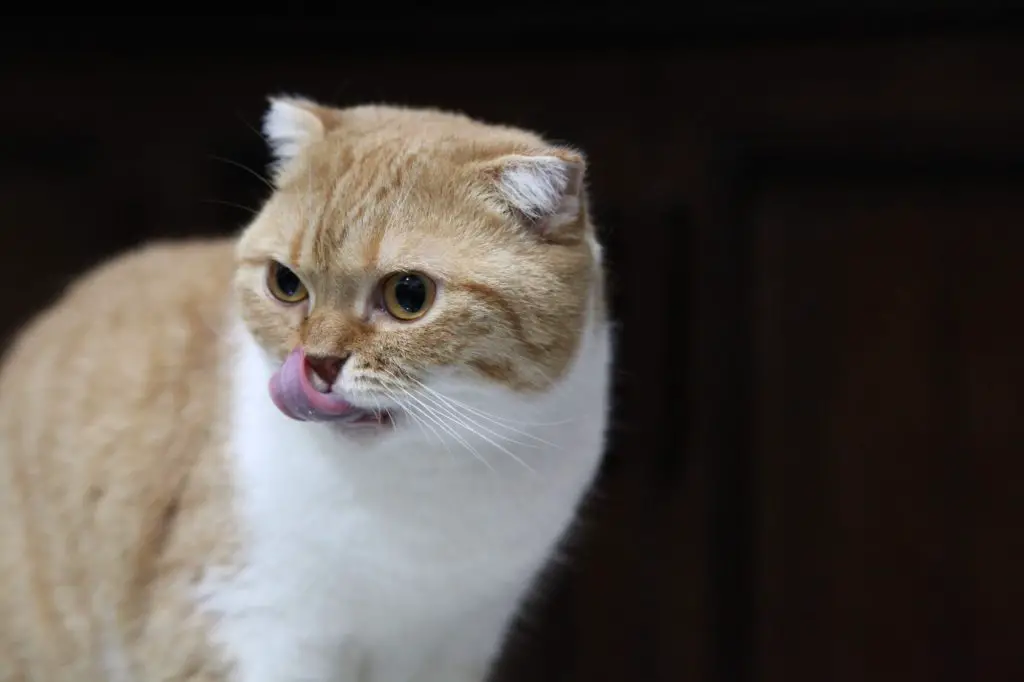
Food That Cats Should Avoid
As well as having human foods that we love to share with our kitties, there are also foods that they should absolutely not go anywhere near. You need to be careful when you have cats in the house to make sure they are not getting into foods that would actually make them sick. Look at the following list to learn what your kitty needs to avoid at all costs.
Grapes or Raisins
In dogs, these will cause kidney problems and sometimes even failure. The science is still out on whether this is also true for cats, but anecdotal evidence has not been positive. Best to keep them away from your cats to be safe.
Citrus Fruits
The fruits are far too acidic for your cat’s meat-friendly stomach to be able to handle. Feeding human food to cats such as oranges, lemons, limes, or grapefruit will likely result in serious gastric complaints and an expensive trip to the vet. Luckily, most cats can’t bear the smell of citrus and won’t go anywhere near them. Try to Avoid Canned Fruit in General and other Cat food in can that contains unhealthy amount of preservatives.
Cherries
The entire cherry plant is toxic to cats, from root to fruit. Keep them away from them, and do not be tempted to feed them any cherries as a sweet treat.
Onions, Garlic, Chive and Leeks
These vegetables all belong to the allium family, which is wholly toxic to cats if consumed in large amounts or eaten over a long period of time. Garlic is by far the worst at five times the toxicity of an onion. Keep them well out of reach of any cats in your household.
Milk
Despite what the cartoons tell us, most cats are actually lactose intolerant and should not be given a saucer of milk. In severely lactose intolerant cats, it could cause total liver failure, so it is really not worth the risk, however much they may protest and appear to love the drink.
Cheese & Other Dairy Products
In the same vein as milk, anything that could potentially contain lactose should be kept out of a cat’s diet. While cheese and yogurts are lower in lactose, they could still be reactive in highly-allergic animals and must be avoided.
Xylitol
This sweetener is highly toxic in dogs and has resulted in several pet deaths. Again, the science is not fully clear on how badly it affects cats, but it is not worth the risk, and you should keep it out of any cat’s diet.
Raspberrries
This small red fruit actually contains small amounts of xylitol in its fruits. As such, like the cherry, it should be kept clear of felines and not given as a treat or snack.
Coffee
The caffeine found in coffee can be highly toxic for cats causing severe hyperactivity and even seizures. Try and keep your coffee (and black tea) cups clear of your cats when you have finished drinking to save them from suffering accidentally.
Chocolate
As with dogs, the theobromine in chocolate has a severe reaction in cats which can cause significant heart problems and seizures at worst and extreme vomiting at best. This includes all kinds of chocolates, including dark varieties and sugar-free versions. Please do not give them to your pets.
If you are concerned that your cat has consumed any of the foods listed above that you suspect may be poisonous, then you must get in touch with your local vet. The sooner, the better, as in most cases, the cat’s stomach will need to be pumped to avoid any major adverse effects. Speak with your vet, and they will be able to advise you further about feeding your cat.
How Much Breakfast(Food) Does My Cat Need?
Make Breakfast For Your Cat
Hopefully, this article has given you some insight into what cats like to eat and what types of food are good for them. You can treat your kitty to an extensive range of meats, fish, fruits, and vegetables to help keep their diet interesting while avoiding canned Cat food. Make sure you keep track of what you feed a Cat and continue a regime of traditional cat food to ensure they get all the proteins and nutrients that they need to live long, healthy lives.
If you enjoyed reading this article, we have lots more about cats and other animals. Why not read another!
